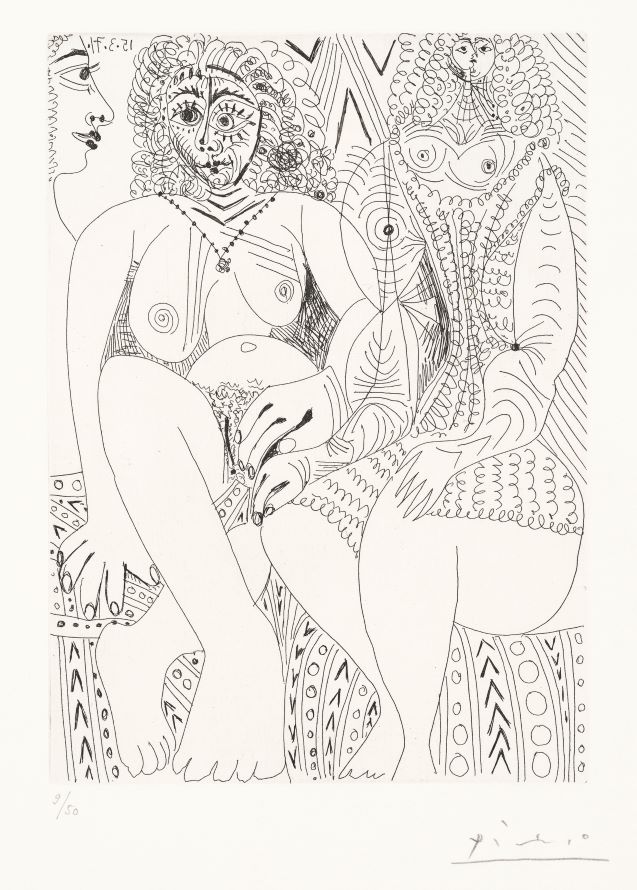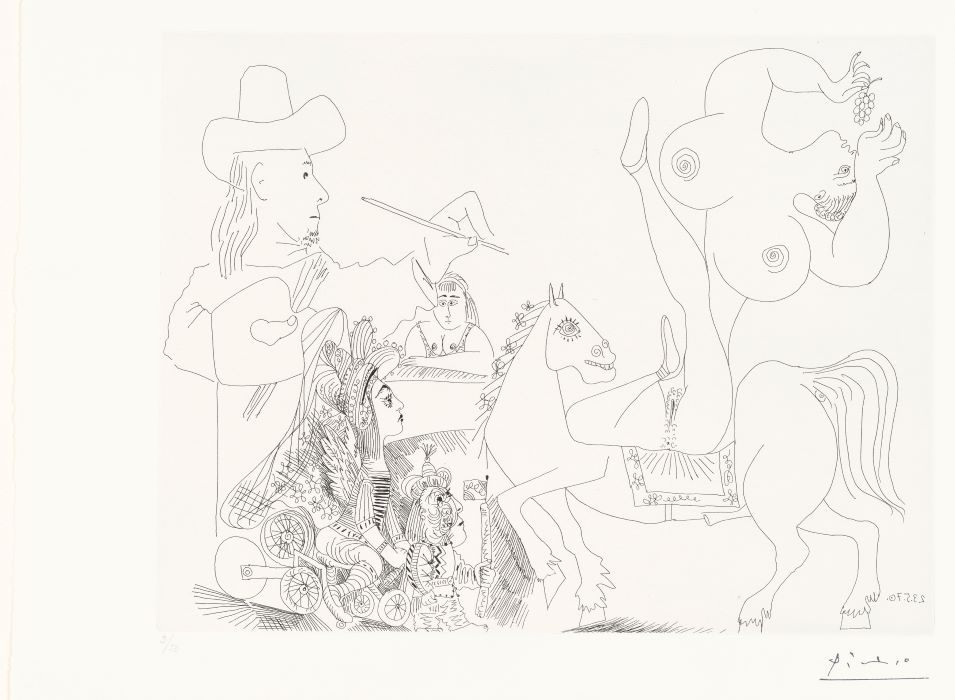8 April 2023 marks the 50th anniversary of Pablo Picasso’s death. Under the title The Picasso Celebration 1973-2023, a large number of exhibitions in Europe and the USA will take this anniversary as an opportunity to bring his work closer to today’s public. The Museum Ludwig collection houses the third largest Picasso collection in the world and is participating in the anniversary year with the graphic arts collection presentation Suite 156, a late work by the artist: 155 etchings from the years 1968 to 1972.
Fig. above: Pablo Picasso, Suite 156 (sheet 55), 23.5.1970, etching, 41.4 x 47.8 cm, Museum Ludwig, Cologne © Succession Picasso/VG Bild-Kunst, Bonn 2023 Reproduction: Rheinisches Bildarchiv, Cologne
The period of the cycle’s creation paralleled the worldwide socio-cultural civil rights movements that culminated in Picasso’s adopted country, France, in 1968 in the so-called Paris May. In his final print cycle, Picasso explores personal memories, love, life and mortality, Western art and cultural history, and the relationships between artists, models and viewers. Their unifying motif is Eros, the Greek god of erotic desire, who expresses as the life instinct and passion of all subjects. When first presented in Paris in spring 1973, the series met with mixed reactions. Positive reviews praised Picasso’s technical skill, but the explicit depiction of sexual behaviour led to controversy. This controversy forms the starting point of the presentation: on the one hand, it highlights peculiarities of collective work in printmaking processes – Picasso worked very closely with the Belgian printmaker Aldo Crommelynk. On the other hand, the suite was created at a time of social change and cultural upheaval, in which the women’s movement, the discourse on body images, body politics, visibility and representation were also expressed in art studies.

Parallel to the period in which Suite 156 was created, the magazine Le Torchon brule was published by activists and artists from the Mouvement de libération des femmes (MLF) in Picasso’s adopted country of France at the École des beaux-arts in Paris. A selection of illustrations, graphics and text contributions from the “menstrual” magazine attests to the work of feminist artistic collectives of the time.
The presentation of the etching series is complemented by a new production by the contemporary Afghan artist Kubra Khademi (*1989 Ghor, Afghanistan). Her art deals politically and at the same time humorously with social norms of female bodies and identities. Here, the body is deliberately used as a provocative artistic means to demand gender justice. For her performance Armor 2015, for example, she walked through the streets of Kabul wearing armour that replicated the female body. As a result, the artist had to leave the country and has been living in exile in France ever since. Her three-part new production of large-format gouache drawings shows donkeys in various partly erotic poses, inspired by Persian miniature and Mughal painting. The drawings visualise oral Afghan everyday culture by picking up on the way women talk to each other about their sexual desire and pass on their knowledge to the next generation of women.
This reversal of gaze from male to female expands the theme of sexual desire to include a non-European, female perspective and provides an opportunity to reflect on Picasso’s Suite 156 in the context of current debates about art and gender.
WHERE?
Museum Ludwig
Heinrich-Böll-Platz
50667 Köln
WHEN?
Opening: Saturday, 28 October 2023, 10 a.m. – 6 p.m.
Exhibition duration: Saturday, 28 October 2023 – Sunday, 4 February 2024
Tue – Sun (incl. public holidays), 10am – 6pm, Mon closed, every 1st Thu of the month: 10am – 10pm.
“Drop-In” printmaking workshop: 2.11. 18-21h, 8.12. 14-17h and 16.1. 14-17h
COSTS? Adults: €12.00 plus advance booking fees, reduced: €8.00 plus advance booking fees Children and young people up to 18 years: free. Admission on the 1st Thursday of the month: from 5 p.m. €7.00 and free all day for Cologne residents.






